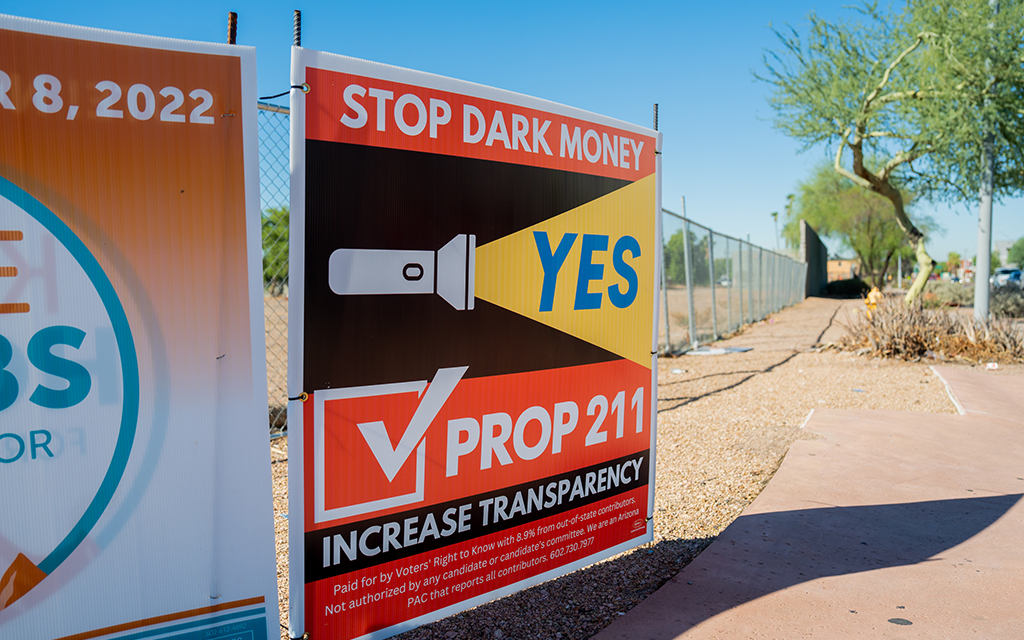
A sign in favor of Proposition 211 is posted on the corner of Central Avenue and McDowell Road in Phoenix on Oct. 12, 2022. (Photo by Samantha Chow/Cronkite News)
PHOENIX – Former Arizona Attorney General Terry Goddard for years has pushed for the Voters Right to Know Act, designed to bring more transparency to politics and especially in campaign spending.
Voters agreed in vast numbers with him on election night, with the Associated Press noting Tuesday night that Proposition 211 had passed.
The measure would require major funders of independent campaign advertising to identify themselves and their donors whose contributions exceed $5,000. The Citizens Clean Elections Commission would be allowed to adopt rules and enforce this law.
It was among 10 initiatives on the 2022 ballot.
Proposition 209
Support for Proposition 209, known as the Predatory Debt Collection Protection Act, to get on the November ballot was incredibly strong. In July, Healthcare Rising Arizona and other organizations turned in a record number of signatures to put the measure before voters.
The organization’s festive watch party at The Pemberton, filled with balloons and yard games, was greeted with more good news as early returns showed strong support for 209.
Terri Streich, a volunteer who has spent three years with Healthcare Rising Arizona, showed appreciation for the people who took the measure into careful consideration.
“I’m so thankful that people took a look at it, and really read it for what it was and what it could do,” Streich said.
Proposition 209 would lower the maximum annual interest rate on medical debt from 10% to 3%. It also would raise the value of homes, cars, bank accounts and other household items exempt from debt collection and adjust debt collection exemptions for inflation starting in 2024. In addition, it would decrease the amount of a person’s disposable income subject to garnishment to 10%, but allows courts to decrease that number to 5% based on economic hardships.
Proposition 128
After the first set of ballot returns were released Tuesday, Proposition 128 had the least support of any of the 10 propositions of the ballot. Proposition 128, introduced by Sen. Vince Leach, R-Tucson, would amend Arizona’s Constitution to allow the Legislature to either make changes or divert funds from voter-approved initiatives if either the Arizona or U.S. Supreme Court later find them to have unconstitutional language.
Proposition 129
Initial returns showed a tight race to approve Proposition 129, with the measure’s approval having a slim lead. Proposition 129, which would amend the Arizona Constitution to require any initiative measure to include just one subject and for that subject to be included in the initiative’s title.
Proposition 130
Proposition 130 appears likely to pass after initial returns. Proposition 130 would amend the state Constitution to give veterans with disabilities and their widows or widowers property tax exemptions regardless of when they became Arizona residents.
Proposition 131
The initiative, which would create a new political office and change the line of succession in Arizona, appears likely to pass. Proposition 131 would amend the state Constitution to add the office of lieutenant governor, starting with the 2026 election. This new position would be elected along with the governor on the same ticket.
In addition, the proposition would make the lieutenant governor the first in line to succeed the governor, replacing the secretary of state.
Proposition 132
Proposition 132 is not on track to be approved, based on initial returns. Proposition 132 would require any initiative or referendum proposing either a new tax or higher taxes to gain at least 60% voter approval to pass. All other proposals would still need a simple majority to pass.
Previous measures related to taxes, including Proposition 208 in 2020, which passed with less than 60% approval and ultimately was struck down by the Maricopa County Superior Court because it ran afoul of a 1980 amendment to the Constitution imposing a formula-based aggregate spending limit for school districts.
Proposition 308
Initial results showed the Dreamer initiative was off to a strong start. Proposition 308 would make undocumented students eligible for in-state tuition at an Arizona university or community college as long as they spent at least two years attending and graduated from an Arizona high school.
This would provide an even easier eligibility route and less expensive tuition for undocumented students that a policy approved by the Arizona Board of Regents in 2019, which said any student who lived in the state for at least three years and graduated from an in-state high school could attend a state university at 150% of the undergraduate resident tuition rate.
Supporters of Proposition 308 gathered at Xico Inc. to watch the result of the election trickle in. Rebecca Shi, the executive director of the American Business Immigration Coalition, was feeling optimistic.
“It’s looking fantastic. Over 60% of the votes have been counted, and we’re at 56% plus in support,” she said.
The proposition would allow for students to receive financial aid regardless of their immigration status. Shi believes the proposition has received support because of the effects it can have on the economy in Arizona.
“It just shows that voters are a lot smarter than the professional politicians. They want solutions, they don’t just want political gamesmanship,” Shi said.
Proposition 309
Initial returns showed the measure was not well supported. Proposition 309 would require voters to show a government-issued photo ID to vote in person, removing the ability to vote in person without photo ID by showing two other identifying documents, such as a bank statement or a utility bill. The initiative also would require the Arizona Department of Transportation to provide a free nonoperator’s licenses to people who wanted one to vote.
In addition, it would require voters who choose to use a mail-in ballot to write their birth date, their signature and either a government-issued ID number or the last four digits of their Social Security number on an “early ballot affidavit.”
Proposition 310
Early returns show support for and opposition to Proposition 310 are roughly even. Proposition 310 would raise the state sales tax by a tenth of 1% – from 5.6% to 5.7% – for the next 20 years to build a new Fire District Safety Fund, which would be distributed to the 144 fire districts in the state.
Shane Brennan and Joshua Shimkus contributed to this story.



